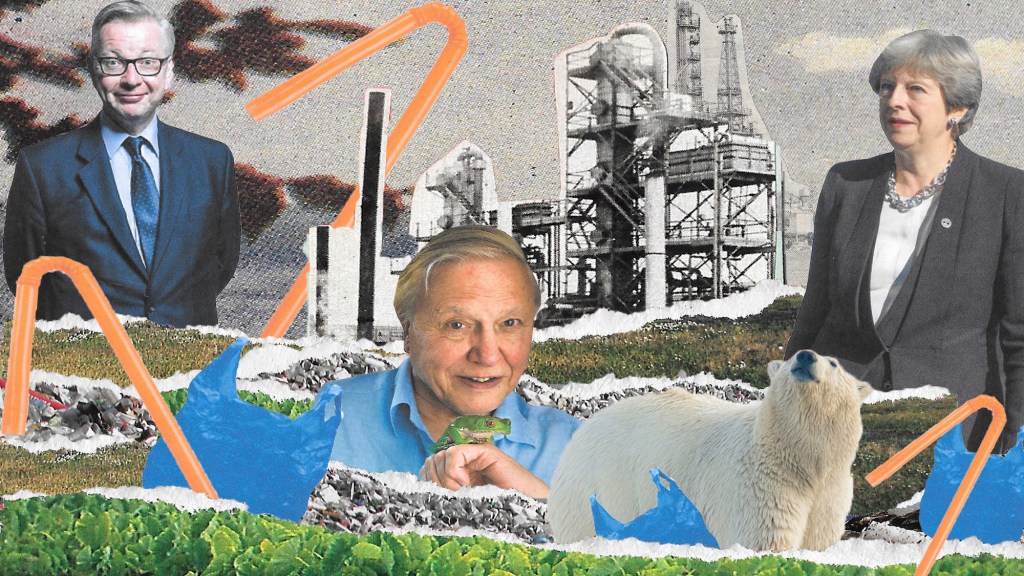Hardly a week goes by without more nerve-shredding news of the climate-based crisis facing humanity. The only response seems to be indifference from politicians and directionless catastrophism from the press. Welcome to “Some Like It Hot”, a column about environmental ruin that doesn’t just say, “Oh god we’re all screwed”, but also: “and here’s why”.
As wildfires tore through California last week, CNN ran a video of a family praying as they drove through what would pass as a hellscape in any Hollywood movie.
Videos by VICE
“Heavenly Father, please help us,” said a woman as her family car made its way through what was left of a town called Paradise. “Please help us be safe.”
Paradise quite literally lost, which is a bit on the nose really.
But even as climate change lays the foundations for disasters like this one in California, some people are doing just fine.
Boosted by the oil price rise this year, Shell’s profits surged 37 percent in the third quarter. Exxon and Chevron’s results greatly exceeded analysts’ expectations, and BP’s profits hit a five-year high.
“These numbers reflect a business which is back on its game,” one analyst told the BBC.
Back. On. Its. Game. Isn’t that great? What an inspiring story of one multinational overcoming a disaster of its own making to take home a £3 billion profit. We can all relate to that. BP is basically Britney.
But while things might be going well for big oil now, there may be trouble ahead.
The rise of electric cars, the lowering cost of renewable energy, court cases demanding polluters are held accountable for our changing climate and the likelihood that some kind of carbon tax will be introduced across the world means analysts and oil execs alike now talk of peak demand, rather than peak supply. In other words, the fossil fuel industry is no longer worried about running out of oil – it’s worried about people needing less of it.
To combat all this, oil companies have tried to paint themselves as essential. They need you to believe that they are going to live forever.
That’s why companies like Shell invest in podcasts, social media campaigns and weird YouTube videos about how millennials love to save the planet by consuming gas: they want to tell you that they are part of the solution on climate change, even if they don’t mention their part in causing it. They’re working on “bridging fuels” like natural gas, they’re investing in renewable energy and they’re studying algae – so one day they can maybe turn it into fuel, or at least get positive press coverage for making you think that’s what they’re doing.
In the UK, energy companies have relied on government support to seem essential. The modern day Conservative party has been happy to help. Philip Hammond’s latest budget was full of gifts for the fossil fuel industry, including preserving tax breaks for North Sea oil producers and measures to build more roads so we can all drive more cars.
According to an Overseas Development Institute report published in 2017, the government already gives around £665 million per year to support the North Sea oil and gas industry.
It also helps British oil companies secure new business overseas. Last year, I reported for Unearthed how the government had helped Shell and BP in their efforts to secure controversial licenses to drill off the coast of Brazil. This area is thought to contain so much oil that environmentalists fear exploiting it could blow the world’s carbon budget.
Look beyond the social media campaigns and you’ll see that oil companies are capable of some top-of-the-range doublethink.
BP America spent at least $11.5 million trying to defeat a move by voters in Washington state to introduce a carbon tax last week. That’s the same BP that says it supports the introduction of a carbon tax worldwide.
In Colorado, oil companies pumped more than $35 million into efforts to stop proposition 112. This move was mainly designed to stop homes near fracking sites blowing up, but would have effectively banned fracking in the state.
Before the vote, both measures stood a decent chance of passing, with one oil-industry-funded poll showing support for proposition 112 at 60 percent.
But in the end, after a flood of oil money, both measures were defeated, leading the New Republic’s Emily Atkin to report that the midterms were a bad day for the environment.
The global economy is close to making a decisive break away from fossil fuels, but the industry is reluctant to accept that fact, so they’ll carry on. Like Mr Creosote from Monty Python’s The Meaning of Life, encouraging us to swallow one more wafer-thin unexploited oil reserve before we explode.
For the time being, as we see the terrifying scenes of our changed and changing climate play out in our media and in our daily lives, big oil clings on: back on its game and still just about essential to our modern lives.
Joe Sandler Clarke is a reporter for Unearthed.
Collage credits: Theresa May (CC By 2.0, via); David Attenborough (CC By 2.0, via); Michael Gove (official Parliament portrait); polar bear (CC By 2.0, via).




